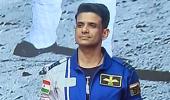'He's gonna inspire billions of girls and boys.'

Tejpaul Bhatia, CEO of Axiom Space, speaks to Rediff US Special Correspondent Abhijit J Masih on the AX-4 mission -- set to launch Indian astronaut Group Captain Subhanshu 'Shuks' Shukla and three crewmates to the International Space Station.
The space flight was to launch on Wednesday, June 11, but has been postponed.
For Bhatia, this mission isn't just business -- it's the culmination of a lifelong obsession, now fueling a new era of access to space.
The concluding segment of a two-part exclusive interview:
- Part 1 of the Interview: Shuks' Space Flight: 'A Leapfrog Moment For India'
You mentioned the administration in India and that you were pleasantly surprised with how quickly things moved.
What was your experience when you visited India and met people from the government?
When you look at the US and India with all the laws and the policies in place, all the restrictions we have here when it comes to critical and national security infrastructure and then you layer bureaucracy on top of that, decision making is a near impossibility.
The way this deal came about and in the time it came out was actually near impossible.
There's only one way it could have been done and this was the two governments to come together.
They assigned the implementing party, which is Axiom, so it worked out perfectly.
It was extremely fast and I think it was because everybody wanted it to done.
There were people on both sides saying -- do it. The belief is what drove the whole thing.
The tipping point though was when Prime Minister Modi came to visit in 2023; you just saw it falling in place.
The ISS is nearing retirement, and Axiom is building its own commercial space station.
Could India play a role in this next-gen station, either through ISRO collaborations or private sector participation?
Very, very much so. I'll give you a little bit of a behind the scenes on how this deal came about. There was never an intention in the first place to send an Indian astronaut.
The conversation actually started for a few reasons. One, as India has been developing its capabilities -- undoubtedly one of the space superpowers.
When we're thinking about the Axiom station and the future of lower orbit post ISS, we need lots of ways to take things and people up and down.
So those conversations actually started from a capabilities and services standpoint.
Now Axiom has the exclusive contract to attach our modules to the ISS.
So there is a big push towards post ISS, but remember Axiom is actually that transition or that bridge.
Now India in this time frame may have the capabilities to participate, however from a treaty standpoint they can't since they are not a member of the ISS partnership.
Our conversation with India actually was much more about let's accelerate our product development paths so we can give each other requirements and get to where the commercial needs to go in that exploration.
When Mr Modi came in 2023 the ISRO-NASA space collaboration was a major part of the dialogue.
That was an accelerant but if you look at everything the two nations can do together and everything Axiom will be doing with the Government of India, this is only one small part of it.

With India's growing ultra-high-net-worth-individuals population, does Axiom see a market for Indian space tourists on future missions?
The most important thing with ultra high net worth individuals overall for this industry, whether they themselves will go to space or they want to invest in space, the key shift right now is the dollar amounts we're talking about is in a very understandable and digestible order of magnitude.
What it takes to put the Axiom station up is actually less than what companies like Google spent to lay fiber across the Atlantic in the 1990s.
There was enough venture capital going into the Internet back then to create infrastructure that has fundamentally transformed humanity.
We're in the exact same point and we're not talking the same dollar amounts.
This is another sector where people can invest money whether that's as consumers, taxpayers or investors. I think there'll be a world very soon where it'll be all three.

The Dragon is equipped with advanced technology that enhances safety and efficiency, including automated docking capabilities and state-of-the-art life support systems.
What was your last conversation with Group Captain Shuks before the crew went into quarantine and what can you tell us about him?
He's the hero we deserve.
We were on a panel and the host said to me "Tej, you managed to find the one guy in India who has more hair than you." Shuks hasn't turned 40.
He's young and I don't know if he was even alive when Rakesh Sharma flew.
So he's a new generation of astronauts. He's also a wonderful spokesperson and he's gonna inspire billions of girls and boys.
He's phenomenal and he's doing great. I keep in close touch with him he's been a wonderful partner.
One of my favorite traditions that we do at Axiom is that we have a town hall and invite everyone from the company and the crew speaks to the staff. We call it the 'Crescendo.'
It's a thank you to the staff and it's an opportunity for the crew to share their gratitude and the experience they've had. That was the last time I saw him before he went into quarantine.

Has he made any special requests before he lifts off?
Not that I can say. But I will tell one quick story though. A few months ago Shuks came to New York for a meeting with the consul general and unfortunately I was somewhere overseas and I wasn't able to join them.
I arrived the day after and I was able to host Shuks at my home with my parents and my wife and my son.
It was just very nice to be able to provide a feeling of home to someone who's very far away from home and away from family.
And we've seen that with every single one of our astronauts, it is a much deeper relationship than a government appointed astronaut training for a mission.
They're representing all of us when they go out there and it's important that we do our part to make them realise how much we care.
Photographs curated by Manisha Kotian/Rediff
Feature Presentation: Aslam Hunani/Rediff










